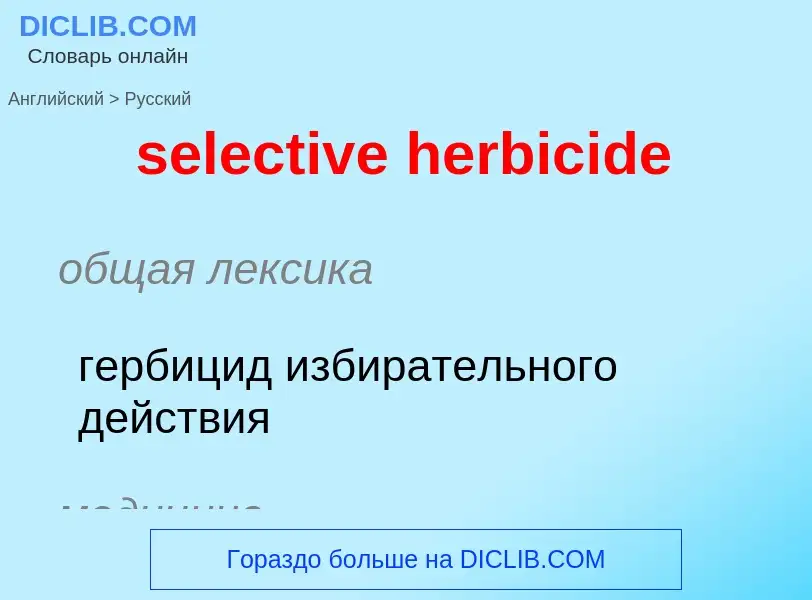Translation and analysis of words by ChatGPT artificial intelligence
On this page you can get a detailed analysis of a word or phrase, produced by the best artificial intelligence technology to date:
- how the word is used
- frequency of use
- it is used more often in oral or written speech
- word translation options
- usage examples (several phrases with translation)
- etymology
selective herbicide - translation to russian
общая лексика
гербицид избирательного действия
медицина
избирательный гербицид
общая лексика
гербицид сплошного действия
[hə:bi'saidl]
общая лексика
гербицидный
прилагательное
сельское хозяйство
гербицидный
Definition
Wikipedia

Herbicides (US: , UK: ), also commonly known as weed killers, are substances used to control undesired plants, also known as weeds. Selective herbicides control specific weed species while leaving the desired crop relatively unharmed, while non-selective herbicides (sometimes called total weed killers in commercial products) can be used to clear waste ground, industrial and construction sites, railways and railway embankments as they kill all plant material with which they come into contact. Apart from selective/non-selective, other important distinctions include persistence (also known as residual action: how long the product stays in place and remains active), means of uptake (whether it is absorbed by above-ground foliage only, through the roots, or by other means), and mechanism of action (how it works). Historically, products such as common salt and other metal salts were used as herbicides, however, these have gradually fallen out of favor, and in some countries, a number of these are banned due to their persistence in soil, and toxicity and groundwater contamination concerns. Herbicides have also been used in warfare and conflict.
Modern herbicides are often synthetic mimics of natural plant hormones that interfere with the growth of the target plants. The term organic herbicide has come to mean herbicides intended for organic farming. Some plants also produce their own natural herbicides, such as the genus Juglans (walnuts), or the tree of heaven; such action of natural herbicides, and other related chemical interactions, is called allelopathy. Due to herbicide resistance – a major concern in agriculture – a number of products combine herbicides with different means of action. Integrated pest management may use herbicides alongside other pest control methods.
In the United States in 2012, about 91% of all herbicide usage, determined by weight applied, was in agriculture.: 12 In 2012, world pesticide expenditures totaled nearly $24.7 billion; herbicides were about 44% of those sales and constituted the biggest portion, followed by insecticides, fungicides, and fumigants.: 5 Herbicide is also used in forestry, where certain formulations have been found to suppress hardwood varieties in favor of conifers after clearcutting, as well as pasture systems, and management of areas set aside as wildlife habitat.


![Handicapped children in [[Vietnam]], most of them victims of [[Agent Orange]], 2004 Handicapped children in [[Vietnam]], most of them victims of [[Agent Orange]], 2004](https://commons.wikimedia.org/wiki/Special:FilePath/A vietnamese Professor is pictured with a group of handicapped children.jpg?width=200)


